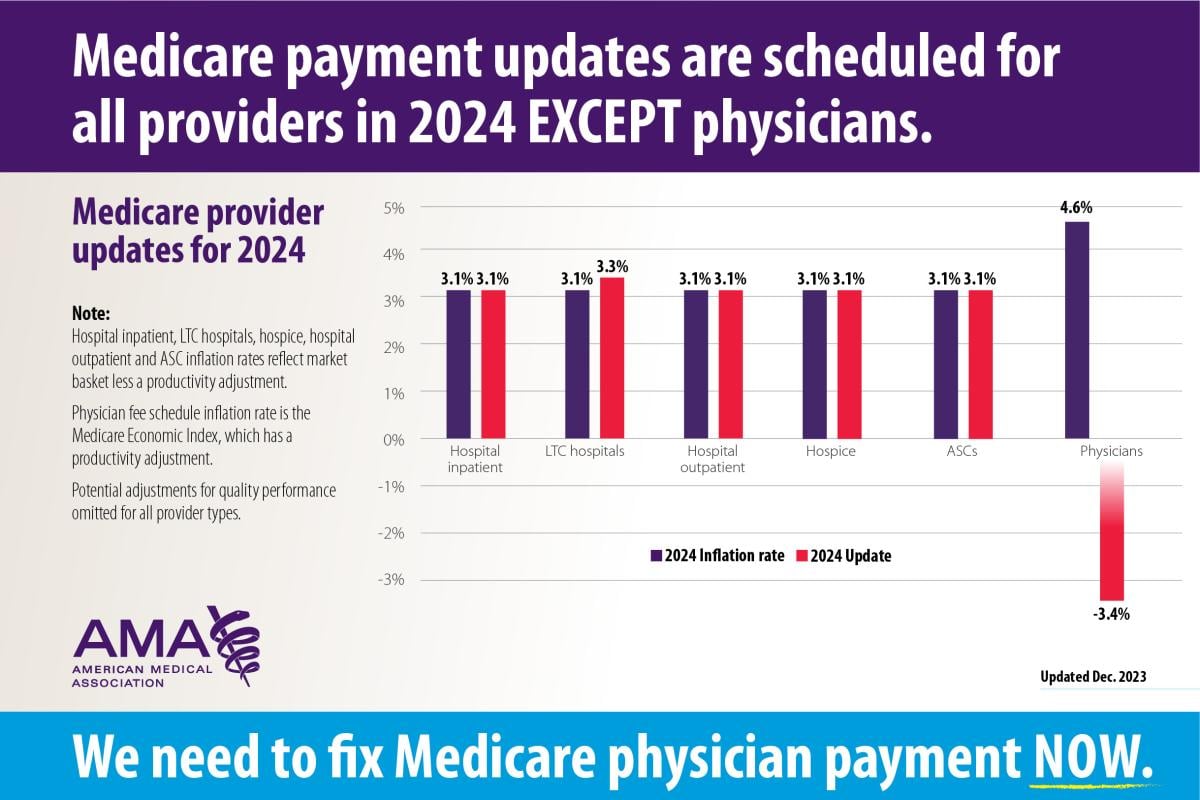The stakes in reforming our nation’s broken and unsustainable Medicare payment system could not be higher for patients, for physicians, and for the entire health care system. We call on Congress to take immediate and meaningful action to fix this financial calamity that is pushing physician practices to the brink.
Physicians are suffering under our current Medicare system as reimbursement rates have plummeted by about 30 percent since 2001, adjusted for inflation. Meanwhile, the cost of keeping independent practices open continues to soar.
Without immediate relief from Congress, I worry about the viability of our health care system, and that health care for tens of millions of patients—including seniors and people with disabilities—is in jeopardy.
As the AMA and physician leaders from around the country gather in Washington, D.C. this week for the AMA’s annual National Advocacy Conference, we are using every tool and resource at our disposal to cancel the 3.37% cut that took effect on Jan. 1 of this year. That cut comes on the heels of the 2% payment reduction in 2023, when the Medicare Economic Index (MEI) was 3.8% last year and 4.6% this year, the highest level this century.
We relaunched our FixMedicareNow.org website to help raise broader awareness of this urgent issue and coordinate our collective physician response. We have created advocacy materials for our partners in organized medicine, including payment trend charts and educational content to more effectively brief policymakers and Congress.
The good news is that AMA helped secure the introduction of H.R. 6683, the Preserving Seniors’ Access to Physicians Act, which would eliminate the full 3.37% Medicare physician payment cut that went into effect in 2024. This is bipartisan legislation is championed by Rep. Greg Murphy, MD (R-N.C.). We strongly urge congressional action on this bill or other steps to avert the cut in the government funding legislation that Congress is currently negotiating.
Longer term, there are already bipartisan solutions in Congress that would help alleviate the financial pain physicians are experiencing. Based on an AMA draft, H.R. 6371 was introduced in the House of Representatives last year by the co-chairs of the GOP Doctors Caucus to reform the budget-neutrality policies that have been producing across-the-board payment cuts.
The reality is that physicians are being punished by an unfair system. Under the current model, physician payments are subject to a six-year payment freeze that ends in 2026. And even when the freeze ends, the statutory update for most physicians will be limited to 0.25% indefinitely, far below even normal rates of inflation.
We have activated our Physicians Grassroots and Patient Advocacy networks and are urging physicians and patients to call on their legislators to co-sponsor H.R. 2474, the Strengthening Medicare for Patients and Providers Act, a bill the AMA helped get introduced that would provide automatic, annual payment updates to account for practice cost inflation as reflected in the MEI. Federation groups have joined this effort in seeking bipartisan co-sponsors for this bill, and in educating members of Congress on why it is so desperately needed.
Cutting back, shutting down
Given the broken Medicare reimbursement system that has persisted for decades, it is clear to see why physician practices are scaling back the number of Medicare patients they serve, or have stopped seeing Medicare patients permanently. My own parents faced this exact situation with their long-time primary care physician. Sadly, such situations often catch families off-guard, leading to frantic searches for a replacement and delays in essential care.
We must not minimize the costs and hardships inflicted on patients and physicians alike under the flawed Medicare system. Reforming that system has been an AMA priority for more than a decade, and we intend to remain relentless in our efforts to secure it.
Change can happen. We need to build upon the support that already exists for achieving Medicare physician payment reform on Capitol Hill. A bipartisan group of nearly 200 members of Congress has co-signed a letter to their leadership urging fast action on legislation. I strongly encourage you to visit FixMedicareNow.org to add your voice to the call for reversing Medicare cuts as part of the upcoming 2024 appropriations package, and for providing a rational Medicare payment system that safeguards access to high-quality care.
Physicians always put patients first. It is time for our political leaders to prioritize our nation’s physician workforce by correcting the flaws in a Medicare system that unfairly penalizes doctors for the care they provide. We can, and must, do better.





